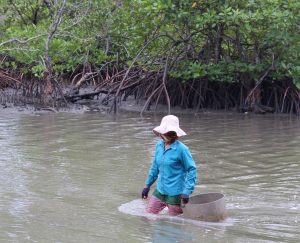Supporting Cambodian Women in Sustainably managing forests

Forests play a crucial role in mitigating the damaging impacts of climate change and both women and men within rural communities derive direct and indirect benefits from forests and trees in the form of employment, forest products, and contributions to livelihoods. In 2016, Cambodia which has one of the most threatened tropical forest areas in the world had a total area of forests estimated at approximately 45% of total land area. Yet this priceless value is threatened by climate change effects and deforestation. Despite all these challenges, women are increasingly positioning themselves to find their rightful place in forest management decision-making processes and activities, which, to date, remains a male-dominated sector.
Sokha, Maradi and Sopanha are three committed Cambodian women working for the Ministry of Environment and Forestry Administration. They are members of the REDD+ (Reducing Emissions from Deforestation and Forest Degradation) Gender Group, helping to make Cambodia’s efforts in forest management more gender-responsive.
Cambodia is growing and developing at an accelerated pace within political, economic and social spheres. While this fast-tracked context offers new opportunities for women, it also creates significant changes which can reinforce and/or worsen existing gender inequalities. Amidst these changes, the country’s society remains quite patriarchal and women are still politically and economically marginalized.
In the forest sector, this often means that even if women show a keen interest in forest management, their voice is barely heard and their participation in decision-making is often disregarded in their own respective forest communities.
“Men think that women are not capable nor interested in forest management activities, this is why women do not feel encouraged to participate.” states Maradi.
Common technical activities like forest patrolling and demarcation are mostly dominated by men. Women tend to stay home and are deprived of any genuine engagement in non-physical and technical forestry activities.
“Women are involved in nursery and other forest activities that are not very far from home.” says Sokha.
Women often have no choice but to assemble firewood and collect fruits and vegetables to enhance the nutrition and health of their households.
Sopanha highlights “Cambodian culture considers that women should work indoor rather than outdoor. As a result, women are hesitant to work far from home. Indeed, less women are involved in forest patrolling activities, as more women like working in tree nurseries.”
However, women’s presence in forest management has been proven to be crucial as they have knowledge on biodiversity and forest management and use. To illustrate, a higher proportion of women participants in local institutions of forest governance is related to significantly greater improvement in forest conditions and conservation.[1] Their knowledge of trees and forests in terms of biological diversity is essential, as well as on resources such as wild mushrooms, tubers, bamboo shoots, etc. The collection of these resources is important for women to enhance the nutrition and health of their households. However, climate change impacts on forests have resulted in reduced crops yields, which, in turn, has had a devastating effect on the livelihoods of women and their families.
In response, Cambodia, through support from the Forest Carbon Partnership Facility (FCPF), has been working in collaboration with the UN Development Programme (UNDP) and other organizations to implement REDD+. The programme aims to strengthen policies and institutions’ capacity to support gender equality in forestry at national, subnational and local levels.
A number of activities has been implemented, including gender trainings and workshops.
Sopanha considers that “making government officers aware of gender issues through trainings is important to support integrated gender perspective in any plans, especially REDD+ programme, for reducing gender gap in society.”
The REDD+ programme is one of the various programmes helping the Government of Cambodia to move forward and strengthen the capacities of both men and women on the importance of gender equality.
As a result, the impact on the population is quite impressive. For Sokha, “There is an indirect impact on local communities as women will be invited to join the meetings and trainings.”
Having both women and men actively and equitably participate and be involved in decision-making can bring about significant improvement to forest management.
For REDD+ Gender Group, the next step will be to work with national technical teams to mainstream gender into National REDD+ Strategy Action and Investment Plan, in order to include it into subnational implementation framework. Several trainings will be carried out to reach subnational REDD+ projects, raise their awareness and enhance gender consideration through all REDD+ interventions.
[1] Agarwal, B. “Gender and Green Governance: The Political Economy of Women’s Presence Within and Beyond Community Forestry” 2010
………………………………………………………..
The story is jointly developed by Ms. Lydie Hountondji, Communications Analyst, Tolasreypeou SEM and reviewed by Elizabeth Eggerts, Ela Lonescu, and Celina (Kin Yii Yong)
Contact:
For more information about Gender in Cambodia REDD+ Programme, please contact:
Ms. Tolasreypeou SEM
Stakeholder Engagement and Communications Officer
